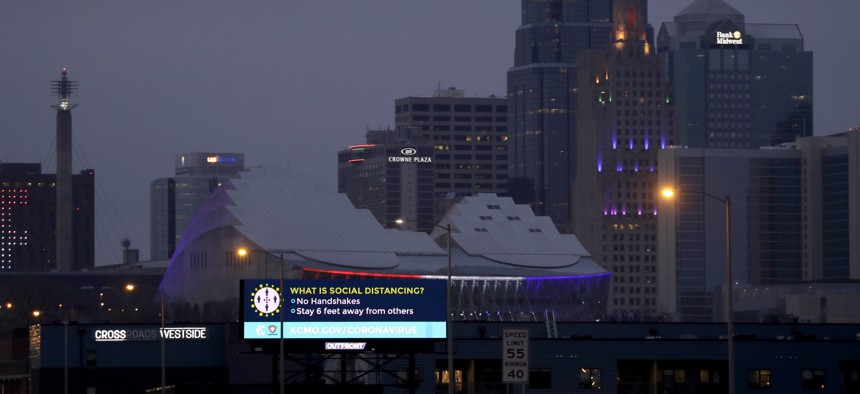Mayors Pessimistic About Cities' Prospects for Post-Covid Rebound

A sign about social distancing stands against the downtown skyline Tuesday, March 24, 2020 on the first day of a stay-at-home order in Kansas City, Mo. AP Photo/Charlie Riedel
Concerns highlighted by the Menino Survey of Mayors include possible deep cuts to local education and the changing economic landscape for local businesses.
A new survey finds U.S. mayors are pessimistic about the ability of their cities to economically recover from the coronavirus pandemic—expressing particular concern over anticipated education budget cuts and the closure of small businesses.
Forty-five percent of mayors said they expect “dramatic” cuts to K-12 school budgets and fewer than 10% expect childcare and public schools to return to normal before next year, according to the Menino Survey of Mayors conducted by the Boston University Initiative on Cities.
The survey also highlights the concern that local government leaders have for their cities’ economies and the financial stability of residents.
Businesses like live entertainment venues, hotels and restaurants face significant financial difficulties, either unable to open at all during the pandemic or forced to significantly curtail how many people they serve at one time. In New York, for example, as many as a third of small businesses could shutter for good amid the economic turmoil.
The Menino survey found that only 36% of mayors expect new businesses to quickly replace those that permanently closed due to the pandemic, while 60% said downtown office buildings will become “less desirable” as employees continue to work remotely.
The survey collected responses from 130 mayors representing cities with more than 75,000 residents between June and August.
Researchers said mayors’ responses this year stood in stark contrast to their generally optimistic views expressed in previous surveys.
“This year, while we still hear glimmers of optimism, their pessimism in the face of a once-in-a-century pandemic is palpable,” said Graham Wilson, director of Boston University’s Initiative on Cities. “And with the pandemic still spreading and the federal government still unable to come to an agreement on additional stimulus, we suspect mayors may actually be underestimating just how much their cities will change.”
Since the CARES Act was passed in March, congressional lawmakers have struggled to come to an agreement over additional coronavirus relief funding. Negotiations between Democrats and Republicans stalled out ahead of the November election, but a bipartisan effort to restart discussions emerged this week with the introduction of a $908 billion coronavirus aid proposal.
State and local government leaders have continued to press Congress for more direct financial assistance to respond to the coronavirus. And the Menino survey found many mayors believed that the federal economic aid fell short of the needs of local businesses and economies. Only 13% of mayors said the Paycheck Protection Program, which provided forgivable loans to businesses, provided enough money to meet local needs. In their responses, several mayors highlighted the disparities in the banking system that made it more difficult for small and minority-owned businesses to obtain PPP funds.
Mayors also expressed concern over the disproportionate effect the pandemic is having on minority groups, which have faced higher Covid-19 infection rates. Two-thirds of mayors said they expect Latinos, renters, immigrants, and Black residents would continue to feel at least “a lot” of economic harm next summer. And 80% of mayors said the coronavirus pandemic is widening racial health disparities.
In the early months of the pandemic, cities explored a variety of initiatives to try and help residents and local businesses. The survey found residential eviction moratoriums were one of the most popular initiatives, with 81% of mayors supportive of moratoriums and 56% of cities enacting moratoriums shortly after the pandemic hit.
Other local initiatives that mayors reported utilizing included direct financial support, including grants (35%) or utility bill or tax forgiveness (16%), and regulatory relief (30%), including initiatives to loosen restrictions to allow outdoor dining or alcohol to-go.
Andrea Noble is a staff correspondent with Route Fifty.
NEXT STORY: Mayors and Governors Apologize for Violating Their Own Covid Suggestions





